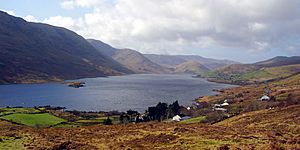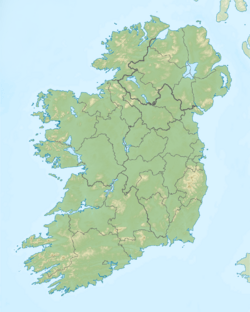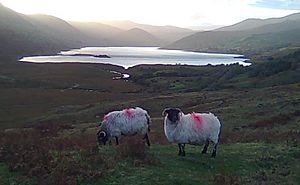Loch Na Fooey facts for kids
Quick facts for kids Loch Na FooeyLoch na Fuaiche |
|
|---|---|

Viewed from Mayo on the R300
|
|
| Location | County Galway |
| Coordinates | 53°34′40″N 9°32′53″W / 53.57778°N 9.54806°W |
| Type | Glacial lake |
| Primary inflows | River Fooey |
| Primary outflows | Finny River |
| Basin countries | Ireland |
| Max. length | 2.5 mi (4.0 km) |
| Max. width | 0.5 mi (0.80 km) |
| Surface area | 2.48 km2 (0.96 sq mi) |
| Surface elevation | 25 m (82 ft) |
| Islands | Red Island (An tOileán Rua) |
| Settlements | Finny, Leenaun |
Loch Na Fooey is a beautiful lake in County Galway, Ireland. It's also known as Loch Nafooey or Lough Nafooey. This lake has a unique rectangular shape. It was formed a very long time ago by glaciers, which are like giant, slow-moving rivers of ice.
Contents
About Loch Na Fooey
Loch Na Fooey is about 2.5 miles (4 km) long and 0.5 miles (0.8 km) wide. It sits in a deep valley with steep sides. Mountains surround the lake, with the Galway mountains to the south and the Partry Mountains in Mayo to the north.
Where is Loch Na Fooey?
The lake is mostly in County Galway. However, a small part of its northern shore touches the border of County Mayo. The closest village is Finny, which is in County Mayo. The village of Leenaun in Galway is about 11 kilometers (7 miles) away.
Water Sources and Features
Many rivers and mountain streams flow into Loch Na Fooey. The main river feeding the lake is the River Fooey. This river starts from a mountain called Devil's Mother. It flows into the western side of the lake. The Finny River flows out of the lake from its southeast side. It then drains into the southwest part of Lough Mask. The lake also has a small sandy beach area at its western end.
There is a small island near the southeastern shore. It's shaped a bit like a funnel. This island is called Red Island, or An tOileán Rua in Irish.
The Ancient Finny Volcano
The area around Loch Na Fooey has an amazing history. It was once the site of an ancient volcano! This volcano, called the "Finny volcano," was active about 490 million years ago. It formed when two huge landmasses of Ireland came together.
Today, you won't see a volcano there. But you can still find some of the special rocks it left behind. These include interesting rocks like pillow lavas and breccia. Pillow lavas are rocks that formed when lava erupted underwater. They look like stacked pillows! Breccia is a rock made of broken pieces of other rocks cemented together.
Fish in the Lake
Loch Na Fooey is home to different kinds of fish. You can find wild brown trout swimming in its waters. There are also pike, which are large fish known for being good hunters.
Exploring the Area
The area around Loch Na Fooey is a great place for walks. There are paths for everyone, from people who enjoy easy strolls to experienced hill walkers who like challenging climbs. It's a wonderful spot to enjoy nature and the beautiful Irish landscape.
 | William Lucy |
 | Charles Hayes |
 | Cleveland Robinson |



